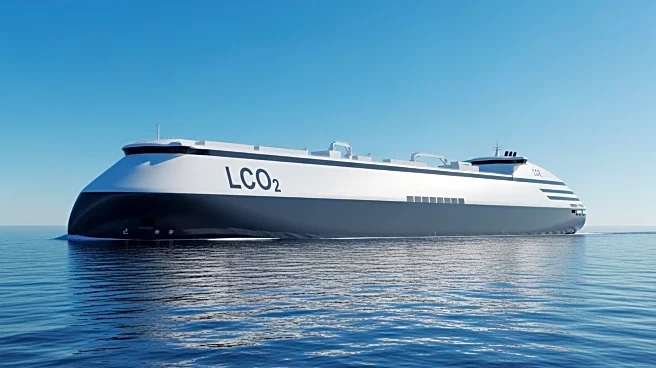What's Happening?
ClassNK has issued an approval in principle (AiP) for a large liquefied CO2 carrier, developed by Dalian Shipbuilding Offshore Co., Ltd. (DSOC) and Nantong Offshore Design & Research Institute Co. Ltd (NODRI). The vessel, with a capacity of 50,000m3, has been reviewed under ClassNK's 'Rules and Guidance for the Survey and Construction of Steel Ships', which includes the IGC Code for ships carrying liquefied gases. This certification confirms the vessel's feasibility from regulatory and safety perspectives, marking a significant step in decarbonization initiatives.
Why It's Important?
The approval of this large LCO2 carrier design is crucial for advancing decarbonization efforts in the maritime industry. By facilitating the safe transport of liquefied CO2, the vessel supports carbon capture and storage solutions, which are vital for reducing greenhouse gas emissions. This development aligns with global environmental goals and enhances the industry's ability to meet stringent regulatory standards. Stakeholders in the maritime sector, including shipbuilders and environmental agencies, stand to benefit from the increased focus on sustainable shipping practices.
What's Next?
ClassNK's approval sets the stage for further development and potential commercialization of the LCO2 carrier. As the industry moves towards greener technologies, similar vessels may become integral to carbon management strategies. Continued collaboration between shipbuilders and regulatory bodies will be essential to refine safety standards and promote widespread adoption of such technologies. The maritime sector may see increased investment in research and development to enhance the efficiency and safety of CO2 transportation.
Beyond the Headlines
The approval highlights the growing importance of regulatory frameworks in supporting innovative environmental solutions. It underscores the need for international cooperation in establishing standards that facilitate the transition to eco-friendly technologies. The development of LCO2 carriers could also influence other industries, such as energy and manufacturing, by providing new avenues for carbon management and storage.












